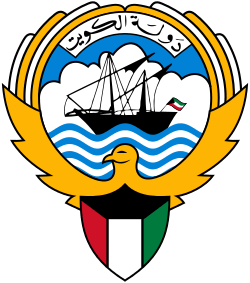Ministry of Finance (Kuwait)
 | |
| Ministerial Department overview | |
|---|---|
| Formed | 1962 |
| Preceding Ministerial Department |
|
| Jurisdiction | Kuwait |
| Headquarters | Kuwait City |
| Minister responsible |
|
| Child Ministerial Department | |
| Website | Ministry of Finance |
Ministry of Finance is one of the governmental bodies of Kuwait and part of the cabinet.
History and profile
In Kuwait finance department dealt with the financial policies of the country until 1962 when the department was reorganized under the name of the ministry of finance and economy.[1][2] In 1963 it was reshaped and named as ministry of finance and industry.[1] Then the body was renamed as the ministry of finance and oil in 1965[1] and dealt with finance- and oil-related policies until April 1975 when the ministry of oil was established.[3] At the same time the ministry was reorganized under the current name, the ministry of finance in 1975.[1] The ministry extensively dealt with land purchases and comprehensive infrastructure projects.[4]
In 1982 Public Investment Authority was established and attached to the ministry.[1] The Kuwait Investment Authority was founded in 1985 and has been under the control of the ministry and has been headed by the finance minister.[5] The ministry also regulates Kuwaiti stock market along with the Kuwait Stock Exchange, the Ministry of Commerce and Industry and the Central Bank of Kuwait.[6]
The ministry which had been dominated by the Bani Jabir branch of the ruling family of Kuwait played a significant role during the invasion of Kuwait by Iraqi forces in 1990 in that it paid billions of dollars to allied countries in the form of aid or in contributions to the war effort.[5] During this period the ministry was located at the London headquarters of the Kuwait Investment Office.[5]
Ministers
The first finance minister was Jaber Al Ahmad Al Sabah, who also ruled the country from 1977 to 2006.[7][8] Jassim Al Kharafi was the finance minister until June 1990 when Ali Khalifa Al Sabah became the minister.[5] Mustafa Al Shamali was the finance minister from 2007 to May 2012.[9] From 4 August 2013 to January 2014 Salem Abdulaziz Al Sabah was the minister of finance.[10] He was replaced by Anas Khalid Al Saleh in the post in January 2014.[11]
References
- 1 2 3 4 5 "Historical Development". Ministry of Finance. Retrieved 21 December 2013.
- ↑ H. V. F. Winstone; Zahra Freeth (1972). Kuwait: Prospect and Reality. London: Allen & Unwin. Retrieved 21 December 2013. – via Questia (subscription required)
- ↑ "Brief History". Ministry of Oil. Retrieved 21 December 2013.
- ↑ Pete W. Moore (Spring 2002). "Rentier Fiscal Crisis and Regime Stability: Business-State Relations in the Gulf" (PDF). Studies in Comparative International Development. 37 (1). Retrieved 30 December 2013.
- 1 2 3 4 "The Finance Ministry, KIA & KIO". APS Review Gas Market Trends. 3 June 1991. Retrieved 21 December 2013. – via HighBeam (subscription required)
- ↑ Nabeel Al Loughani; David Chappell (2001). "Modelling the day-of-the-week effect in the Kuwait Stock Exchange: a nonlinear GARCH representation". Applied Financial Economics. 11 (4). doi:10.1080/096031001300313910. Retrieved 30 December 2013. Cite uses deprecated parameter
|coauthors=(help) - ↑ "Obituary: Sheikh Jaber, Emir of Kuwait". BBC. 15 January 2006. Retrieved 10 September 2014.
- ↑ "His Highness Sheikh Jaber III". The Telegraph. 16 January 2006. Retrieved 10 September 2014.
- ↑ Mahmoud Harby (24 May 2012). "Kuwait finance minister quits after opposition push". Reuters. Retrieved 10 September 2014.
- ↑ "Kuwait's new cabinet". Global Post. AFP. 4 August 2013. Retrieved 21 December 2013.
- ↑ "Kuwait cabinet reshuffle brings seven new faces". Asharq Al Awsat. London. 7 January 2014. Retrieved 10 September 2014.